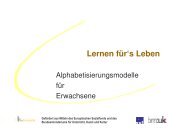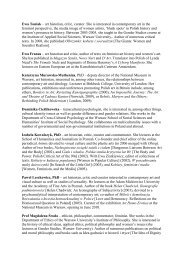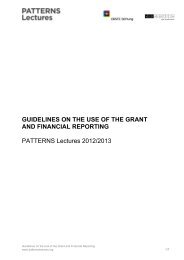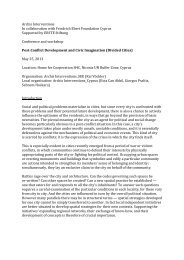DIE ERSTE österreichische Spar-Casse ... - ERSTE Stiftung
DIE ERSTE österreichische Spar-Casse ... - ERSTE Stiftung
DIE ERSTE österreichische Spar-Casse ... - ERSTE Stiftung
Create successful ePaper yourself
Turn your PDF publications into a flip-book with our unique Google optimized e-Paper software.
CZECH REPUBLIC<br />
General<br />
Czech tax implications largely depend on whether the Notes qualify as securities. Certain<br />
types of Notes (e.g. certificates and warrants) are not explicitly defined by Czech law.<br />
However, according to a statement published by the Czech National Bank (Czech financial<br />
market regulator), the term "securities" also involves securities that are not specified in the<br />
Czech Capital Markets Act – provided that they meet the general conditions for securities as<br />
indicated in the Czech National Bank’s official statement of 10 September 2007 regarding the<br />
issue of securities that are not provided for by Czech law, published in the Czech National<br />
Bank’s Bulletin.<br />
The information below is based on the assumption that the Notes fulfill all conditions for the<br />
treatment as securities under Czech law. For Czech taxation purposes, proceeds from<br />
specific Notes will be treated either as interest income or capital gains, which may result in<br />
differences in taxation. Prospective investors should verify, among others, the nature of the<br />
Notes and the type of income for each type of the Notes.<br />
Residents<br />
Capital gains<br />
Under the double taxation treaty between Austria and the Czech Republic capital gains from<br />
the sale of the Notes by a tax resident of the Czech Republic are taxable in the Czech<br />
Republic.<br />
Individual investors<br />
Capital gains from the sale of the Notes are exempt from Czech personal income tax if an<br />
individual has held the Notes as a non-business asset for an uninterrupted period of more<br />
than six months. This time limit only applies to non-shareholders and shareholders of the<br />
Issuer who hold a stake of less than 5% in the issuer of the Notes. In all other cases, the<br />
individual must hold the Notes for an uninterrupted period of more than five years for the<br />
personal income tax exemption to be applicable. Either way, the exemption only applies if the<br />
Notes have not been included in the individual’s business assets at any point in time prior to<br />
their sale.<br />
If capital gains from the sale of the Notes held by individuals as a non-business asset are not<br />
tax-exempt, they are subject to personal income tax at a flat rate of 15%, the tax base being<br />
calculated as the income from the sale of the Notes reduced by the purchase price of the<br />
Notes and costs related to their acquisition. A loss from the sale of the Notes may be offset<br />
against gains from the sale of the Notes or other securities in the same fiscal period.<br />
In the case of individuals holding the Notes as a business asset the capital gain from the sale<br />
of the Notes is included in their general income tax base and taxed at a flat rate of 15%. A<br />
loss from the sale of the Notes may be offset against their overall taxable income (other than<br />
employment income) in the current fiscal period. Excess tax losses generated in the current<br />
fiscal year may be carried forward for five fiscal periods.<br />
Corporations<br />
Capital gains from the sale of the Notes held by corporations are to be included in their<br />
general income tax base and taxed at a flat rate of 19%. A loss from the sale of the Notes<br />
may be offset against profits in the current fiscal period or may be carried forward for five<br />
fiscal periods.<br />
Interest<br />
Page 79










